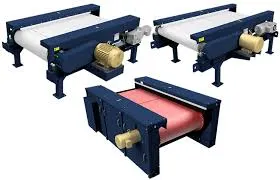
10 月 . 19, 2024 09:31 Back to list
The Rise of Small Metal Shredders Revolutionizing Scrap Processing
In an age where sustainability and efficient waste management are at the forefront of global concerns, small metal shredders have emerged as a pivotal tool in the recycling industry. These compact machines have garnered attention not only for their ability to process scrap metal but also for their role in promoting environmental responsibility and economic viability.
Small metal shredders are designed to shred various types of metals, including aluminum, copper, and steel. Their primary function is to reduce bulky metal items into manageable pieces that are easier to transport and process. This reduction in size significantly enhances the efficiency and effectiveness of recycling operations, as smaller pieces can be more readily melted down and reused in manufacturing processes.
One of the most compelling advantages of small metal shredders is their versatility. Unlike larger industrial shredders, which may require substantial investment and space, small shredders can be utilized by a wide range of businesses, from small scrap yards to workshops and even DIY enthusiasts. This accessibility allows more individuals and organizations to participate in metal recycling efforts, thereby fostering a culture of sustainability at the grassroots level.
Moreover, small metal shredders contribute to the economic benefits of recycling. With the global demand for recycled materials on the rise, businesses that invest in metal shredding equipment can tap into new revenue streams. Scrap metal prices fluctuate based on market demand, but the steady need for recycling ensures that businesses can recover costs and potentially earn profits through the sale of shredded metals to larger processing facilities.

In addition to financial benefits, the environmental impact of small metal shredders is profound. By promoting the recycling of metals, these machines help reduce the amount of waste that ends up in landfills. Metal recycling also conserves natural resources; for instance, recycling aluminum saves up to 95% of the energy required to produce new aluminum from raw ore. This conservation of energy not only lowers production costs but also diminishes greenhouse gas emissions, aligning with global efforts to combat climate change.
The technology behind small metal shredders has seen significant advancements over the years. Modern shredders are equipped with features that enhance their performance, such as high-torque motors, adjustable shredding blades, and advanced control systems. These innovations allow operators to customize the shredding process according to the type of material and desired size, ensuring that the output meets specific recycling standards.
However, it is essential to acknowledge the challenges that come with the operation of small metal shredders. Safety is a paramount concern, as improperly handled machinery can lead to accidents. Therefore, operators must adhere to strict safety protocols and receive adequate training to mitigate risks. Additionally, while shredders are effective in reducing the size of metals, they may not be capable of separating different types of metals, which requires further processing equipment.
Looking ahead, the future of small metal shredders appears bright. As awareness of environmental issues continues to grow, the demand for effective recycling solutions will likely increase. The integration of smart technologies, such as IoT connectivity and artificial intelligence, may further enhance the capabilities of metal shredders, allowing for real-time monitoring and improved operational efficiency.
In conclusion, small metal shredders play a crucial role in modern recycling efforts. Their ability to transform scrap metal into valuable resources not only supports the economy but also contributes to a more sustainable future. As technology evolves and the recycling industry adapts, these compact shredders will undoubtedly remain a fundamental component of effective waste management strategies, driving both economic and environmental benefits forward. Embracing this innovation is not just a step toward smarter recycling; it is part of a larger movement toward a more sustainable planet.
Latest news
Unveiling the Power of Eddy Current Separator
NewsSep.25,2024
Transform Your Home Recyclin:home metal shredder
NewsSep.25,2024
The Future of Waste Management with Recycling Line Picker
NewsSep.25,2024
The Benefits of a Metal Recycling Plant
NewsSep.25,2024
Revolutionize Material Separation with Onwang Technology
NewsSep.25,2024
Innovative Waste Management: Unveiling the MSW Sorting Plant
NewsSep.25,2024